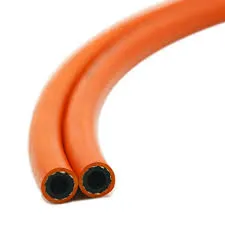LPG/LNG hose is suitable for the transportation of liquefied petroleum gas and liquefied natural gas, Liquefied petroleum gas is very easy to ignite spontaneously. When the concentration in the air reaches a certain value, it may explode when exposed to an open flame. Therefore, pipes used in liquefied petroleum gas also need to meet certain requirements.
Application And Features
Liquefied petroleum gas hoses are also called LPG propane hoses, a type of pneumatic hose used in domestic and industrial applications, they have good flexibility, heat aging resistance, good elasticity, and good corrosion resistance. The transmission medium includes liquefied gas, liquid ammonia, propylene, organic solvents, micro-particles, etc.; Mainly used in oil fields, refineries, chemical plants, and liquefied gas stations.
Wire Braided LPG&CNG Gas Hose
Structure
Tube: smooth, UHMWPE and EPDM synthetic rubber
Reinforcement: High tensile textile cord with helix steel wire
Cover: oxidation resistance, corrosion resistance, synthetic rubber
Temperature range: -40℃-120℃
Precautions about LPG pipes
- Liquefied gas is flammable and explosive. For safety, you must purchase qualified LPG hoses.
- The liquefied gas hose has a certain service life. Please check and replace it regularly to ensure its safety performance.
- The hoses should be stored in a dry, ventilated, cool place without fire sources. Do not store in the sun to avoid high-temperature aging.
- When installing the gas hoses, you must use recommended and tested couplings designed for LPG hoses and make sure there is no leakage before use.
- Regularly check whether the hose has any problems, such as aging, hardening, deformation or cracks, etc. If problems are found and replaced in time.





